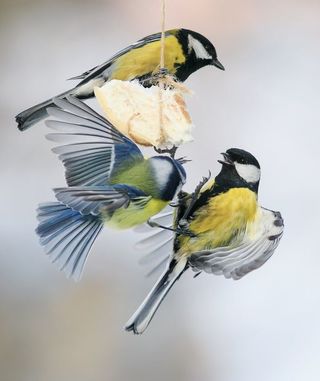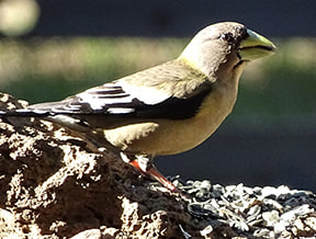 Good article about when feeding is good or bad for birds, read it here: When is it OK to feed birds? They point out that feeding is actually NOT always good for birds. Many assume that feeding has to be good, how can it not? Their key example is the Florida scrub jay, a popular feeder bird until their babies started dying and USFWS made it illegal to feed them (thankfully). The birds were breeding too soon in the season due to the availability of adult food (feeders) - something I think happens A LOT with most feeder birds. Sadly, the insect population the parents relied on for baby food was not born yet, and the babies were starving to death. Parent songbirds must feed insects; our sunflower seeds are NOT good baby foods. As a result of feeders, breeding too early meant the birds' young did not have the foods they needed to survive. I am sure some people are ignoring the USFWS if they have not educated themselves on the science behind the decision to make it illegal (not sure how USFWS can enforce it either, which is sad for this nearly extinct bird). With only 5000 FL scrub jays left, this is a critical issue. Birds are complex, we cannot always know what our innocent and well-intentioned actions are really doing. Here in Central Oregon, we should have the same concerns for our birds. Our feeders do not help parent birds with feeding babies - parents yes; babies eat bugs. What is more helpful for baby birds? NATIVE PLANTS. Those pesky sage, bitterbrush, and rabbitbrush shrubs, the 10+ species of grasses, our native flowers, serviceberry and other native berry trees (if we are near water). And Juniper!!! Even hummingbirds eat insects, and must feed babies insects. TIP: Do not make your feeders that reliable. Pull them down in the spring, when warm weather starts. Give them a thorough cleaning and wait a week to put back up. Let them run out. Make the birds breed where they will find good habitat, not a McDonalds. Summer feeding should not be free every day buffet. Make your birds work. Some songbird predator bird populations are increasing greatly. Scrub and Steller jays for example. Raccoons now live under everyone's hot tubs and in places where they never have...becoming a new, very real threat. Raccoons small hands can reach into and grab almost any bird in any cavity. Our feeding birds has sent their numbers skyrocketing. All rodents, squirrels, and raccoons eat baby and fledgling birds. (For this reason, do not "check" on your nest boxes, or you will be making a little "here's dinner" path for your jays and raccoons who you can be sure are watching you. Let your birds be hidden. (No, citizen "science" does not make up for the death of those babies). Is Feeding Bad - No, and sometimes.NO, feeding is not always bad for birds. In fact, just the opposite during really cold stretches or suffocatingly hot times. Birds do need our help sometimes, and its wonderful that people care. We just need to make sure that what we are doing is not harming them. The Audubon article is a great example of good intentions gone bad. As the article points out, how and what we feed and care of our feeders is paramount. Birds do not always naturally congregate at one food source, every single day. Yes, the robins and waxwings might launch a food attack at a Juniper or Mountain Ash in berry season. But they do not go there every day for weeks on end. Sanitation then becomes a real risk to our birds. And yes, birds carry parasites, mites, infections (like conjunctivitis - common in finches, now the goldfinch too), disease (salmonella - pine siskins in particular), coccidia (robins, jays), giardia (any and all), etc. They can share these with other birds. No reason to keep them out, but common sense and prevention are key. Cleanliness is the key actually. Clean those feeders! Bleach kills a lot of bacteria, not much else. So use carefully, 10% solution rinse. Then you must wash it again with soap to remove bleach residue or you will harm the birds as bleach leaves a toxic scum. Rinse, rinse, rinse. No wood feeders! Use ultra hot water, that is more effective than bleach. At the rehab, our water heater is set at 168 degrees (yeah, don't put your hands in it when its full on hot water at the tap!). But that kills A LOT. I have a hot water faucet outside so that I can wash things outside with that hot water and sterilize. A great solution, kills weeds too, though that is not a water wise answer for that...pulling is. Nest boxes? Another topic for another day, but we are taking on a huge responsibility when we invite birds to our yards either for food or to have babies. Example: I have a pair of white breasted nuthatch nesting in what I considered a 'decorative' next box on our porch. They are early in my opinion since it is 30 degrees at night. (I will likely put a hot pad under the box today). But they are here because they have easy and free food for the parents. I hope there is enough food for them right now. The cold spell could be killing a bunch of bugs right now. Freezing does kill larvae (which is why a warm winter leads to more ticks, as more bugs make it to breed; and then freezing kills larvae reducing the population). A bad tick year, is a good bug year for birds (except for their mites and nest parasites, which is why you want to clean out your bird boxes except for species that do not rebuild the nest). My newsletter will have more bird feeding tips next go around, so if interested in that, sign up for my newsletter by emailing me your name and email address: [email protected]  Suet: my newest pet peeve on feeding. Birds are getting oiled by suet and nut butters. I read article after article on all this "great" feeding ideas with fats...Um...NO let's not put FAT out where birds can get into it? Might as well just take a jug of engine oil and spread it into the trees - that is essentially what is happening. OIL is OIL...for a bird. Crude oil and peanut butter fat are NO DIFFERENT ON A BIRD'S FEATHERS. It takes the same solvents and surfactants (soaps, Dawn usually) to remove peanut butter oils or suet oils off the feathers as it does the Exxon or BP crude oil. An oiled bird is a dead bird. See my next post on Suet feeding tips!
0 Comments
 Fun day with the ladies at the Sisters Community Church Spring Luncheon! They kindly invited me to speak about my favorite topic - Birds! Once I have some pics, I will fill in more about it all. Thank you so much to Carol and the organizers of the aptly titled, "Birds of a Feather" Luncheon. A sincere THANK YOU to all the ladies (over 70!) who took time out of their busy Saturdays to come to the event. We all enjoyed the beautiful song of a young gal, and an elegant dance of another, and then they listened to me chatter on about my favorite topic - Birds! What a fun, wonderful event. I promised I would post two links to webpages that folks can check out for ideas on how to provide more great habitat for their wild birds that come to their yards. We are lucky in Central Oregon that we have so much native habitat and native plants available to us. These links will tell you more about the native plants and habitat good specifically for our neck of the woods. They are wonderful, so enjoy! 1) Habitat Network - Go to main page, choose "Explore," just type in your zip code and our "Ecoregion" will show up. And for more information, read some of the articles under "Learn." 2) Nest Watch - so much to explore here. Look up our region: Go to "Learn", go to "Common Nesting Birds", choose region "West", choose "Open Woodland" (that's Central Oregon) - and a whole bunch of birds that nest here will appear. Simply click on the ones you want to learn about, its super easy! You can learn about landscaping for birds also under "Learn." Have fun! Here's to all of our lovely birds - the gems of the air and we are blessed to have them! |
AboutNative Bird Care's is celebrating its 10th anniversary! Our main focus is song, shore, and waterbirds. We offer specialized care and facilities for these extraordinary birds.. Archives
July 2024
Categories
|



 RSS Feed
RSS Feed